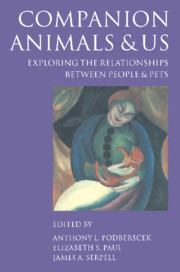Book contents
8 - Companion animals and human health: physical and cardiovascular influences
from Part II - The nature of the relationship
Summary
INTRODUCTION
Contributions of animals to meet basic human health needs include functioning as food, clothing, beasts of burden, working and assistance animals, in addition to medical uses such as vaccine production or as human surrogates for the development of medical procedures and products (Lierman, 1987). Animals also have well-documented detrimental effects on basic human health, including zoonoses, allergies and as sources of injury (Schantz, 1990; Plaut, Zimmerman & Goldstein, 1996; Centers for Disease Control and Prevention, 1997).
In the last two decades researchers have begun to assess the possibility that animals could have more subtle positive effects on human health, perhaps by satisfying what Maslow (1970) termed higher order needs. The cardiovascular system was a logical starting point for evaluating the effects of owning pets on human health since cardiovascular disease was one of the first chronic non-psychiatric diseases upon which psychological and social factors were found to have significant impact (Jenkins, 1976).
LONG-TERM EFFECTS
Four epidemiological studies have demonstrated the potential of pets to influence the cardiovascular health of their owners. In the first epidemiological study, pet owners were found to be more likely to be alive one year after discharge from a coronary care unit than non-owners (Friedmann et al., 1980). The relationship of pet ownership to survival was independent of disease severity and other sources of social support (see Friedmann, 1995).
Two subsequent epidemiological comparisons, using larger samples of coronary heart disease patients, suggested that different types of pets might provide different benefits. Among 369 post-myocardial infarction patients with ventricular arrhythmias who participated in the Cardiac Arrhythmia Suppression Test (CAST), both pet ownership and amount of social support tended to predict one-year survival, independent of the physiological severity of the cardiovascular disease, and of other demographicandpsychosocial factors (Friedmann&Thomas,1995).Dogowners were approximately 8.6 times as likely to be alive after one year as those who did not own dogs (p_0.02). Social support was also a significant predictor of survival (p_0.05).Theeffects ofdogownershipandsocialsupport on survivalwere independent of each other and of the physiological severity of the illness. No parallel independent effect of cat ownership was observed.Not only did cat ownership not predict survival, cat ownerswere actually more likely to die than non-owners (p_0.03). Cat ownership was also associated with lower social support.
- Type
- Chapter
- Information
- Companion Animals and UsExploring the relationships between people and pets, pp. 125 - 142Publisher: Cambridge University PressPrint publication year: 2000



